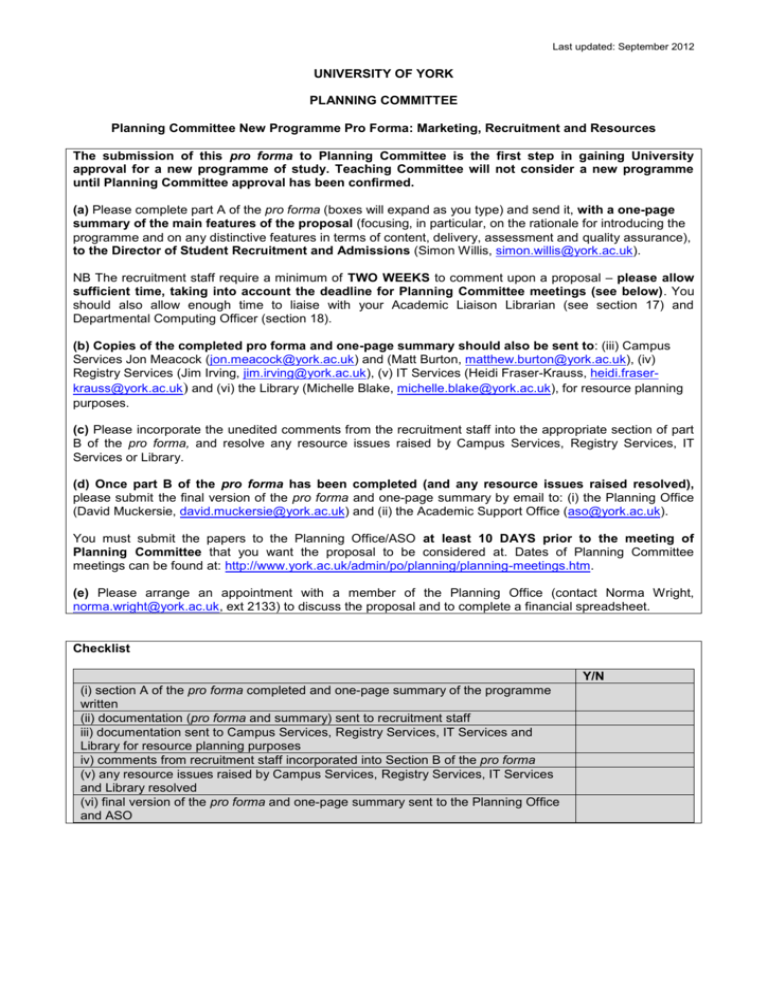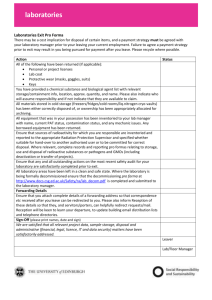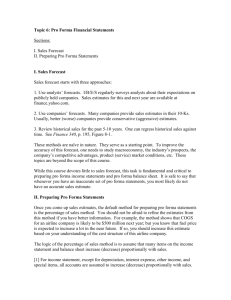UNIVERSITY OF YORK
advertisement

Last updated: September 2012 UNIVERSITY OF YORK PLANNING COMMITTEE Planning Committee New Programme Pro Forma: Marketing, Recruitment and Resources The submission of this pro forma to Planning Committee is the first step in gaining University approval for a new programme of study. Teaching Committee will not consider a new programme until Planning Committee approval has been confirmed. (a) Please complete part A of the pro forma (boxes will expand as you type) and send it, with a one-page summary of the main features of the proposal (focusing, in particular, on the rationale for introducing the programme and on any distinctive features in terms of content, delivery, assessment and quality assurance), to the Director of Student Recruitment and Admissions (Simon Willis, simon.willis@york.ac.uk). NB The recruitment staff require a minimum of TWO WEEKS to comment upon a proposal – please allow sufficient time, taking into account the deadline for Planning Committee meetings (see below). You should also allow enough time to liaise with your Academic Liaison Librarian (see section 17) and Departmental Computing Officer (section 18). (b) Copies of the completed pro forma and one-page summary should also be sent to: (iii) Campus Services Jon Meacock (jon.meacock@york.ac.uk) and (Matt Burton, matthew.burton@york.ac.uk), (iv) Registry Services (Jim Irving, jim.irving@york.ac.uk), (v) IT Services (Heidi Fraser-Krauss, heidi.fraserkrauss@york.ac.uk) and (vi) the Library (Michelle Blake, michelle.blake@york.ac.uk), for resource planning purposes. (c) Please incorporate the unedited comments from the recruitment staff into the appropriate section of part B of the pro forma, and resolve any resource issues raised by Campus Services, Registry Services, IT Services or Library. (d) Once part B of the pro forma has been completed (and any resource issues raised resolved), please submit the final version of the pro forma and one-page summary by email to: (i) the Planning Office (David Muckersie, david.muckersie@york.ac.uk) and (ii) the Academic Support Office (aso@york.ac.uk). You must submit the papers to the Planning Office/ASO at least 10 DAYS prior to the meeting of Planning Committee that you want the proposal to be considered at. Dates of Planning Committee meetings can be found at: http://www.york.ac.uk/admin/po/planning/planning-meetings.htm. (e) Please arrange an appointment with a member of the Planning Office (contact Norma Wright, norma.wright@york.ac.uk, ext 2133) to discuss the proposal and to complete a financial spreadsheet. Checklist Y/N (i) section A of the pro forma completed and one-page summary of the programme written (ii) documentation (pro forma and summary) sent to recruitment staff iii) documentation sent to Campus Services, Registry Services, IT Services and Library for resource planning purposes iv) comments from recruitment staff incorporated into Section B of the pro forma (v) any resource issues raised by Campus Services, Registry Services, IT Services and Library resolved (vi) final version of the pro forma and one-page summary sent to the Planning Office and ASO Last updated: September 2012 PART A Contact details Main and secondary contact for any queries about the proposal (please specify the department and give a telephone extension and email address for each individual) 1 Programme Title (e.g. BA/MA in X) 2 Departmental approval Please confirm that this proposal has been signed off by the Head of Department, and the Chair of the Board of Studies (and/or the Chair of the Graduate School Board). 3 Strategic fit Why does the department want to introduce the programme (for example, has it been devised in response to external prompting)? How does the introduction of this programme fit with the department’s strategy for teaching and research? How does the introduction of this programme fit with the University’s Plan? 4 Relationship to the rest of the department’s portfolio How does the programme fit into the department’s existing portfolio? Does the programme replace any existing programmes? What impact will the programme have on the teaching activity of the department e.g. in terms of the balance between postgraduate and undergraduate teaching? 5 Factors affecting the programme’s market 5a Indicate the type of student who is expected to be attracted by the programme (e.g. school-leavers, new graduates, mid-career professionals) and the broad academic and skills requirements for admission to the programme (including any requirement for work experience). Is the nature of the proposed student market reflected in the structure and delivery of the programme? For example, if a programme is aimed at mid-career professionals, is a part-time and/or distance learning route available? 5b Indicate the expected progression routes for students on completion of the programme (e.g. whether the Last updated: September 2012 programme prepares students for entry to a particular career or further academic study). 6 Implications for departmental student number targets 6a How many students is the department expecting to recruit in each of the first five years of the programme? Year 1 Year 2 Year 3 Year 4 Year 5 Full-time UK/EU Full-time overseas Part-time UK/EU Part-time overseas Distance-learning UK/EU Distance-learning overseas 6b Proposed start date of programme 6c From which geographical areas does the department expect to recruit its overseas students? NB: students from within the European Union do not count as overseas in this context. 6d Please describe the market research and statistical analysis which the department has undertaken in order to assess demand for this programme in the markets (home and overseas) specified above. 6e Are the numbers associated with this programme intended to be additional to student number targets already agreed as part of the medium-term planning process, or are they intended to contribute to meeting these targets? 6f Do you expect to offer the programme for an indefinite period or does it have a limited ‘shelf life’? Do you anticipate that it will be on offer for entry every year? 7 Competition 7a Will this programme be competing, directly or indirectly, for students with other programmes in the department? If so, please indicate which. Last updated: September 2012 7b Could this programme compete (or be perceived to compete), directly or indirectly, for students with programmes in other departments/centres within the University? If so, please indicate which. Please confirm that you have consulted with the department(s)/centre(s) concerned and state how any issues raised by the other department(s)/centre(s) have been resolved. NB If you make any significant changes to the programme (including the title and content) subsequent to gaining approval from the other department(s)/centre(s), you must repeat the process of consultation prior to bringing forward the proposal to Planning Committee. You should provide written evidence of the consultation and agreement (e.g. a memo or email from the relevant Head of Department(s)). If issues of competition prove difficult to resolve, please consult with the relevant Academic Coordinator. Please note that if convincing written evidence is not submitted and/or there are any concerns about the level of consultation/agreement, Planning Committee and/or UTC may refer the proposal to the relevant department(s)/centre(s). 7c Please list any similar programmes at other UK universities, with which this programme will be competing. What will distinguish the York programme from its competitors? 8 Pricing of postgraduate programmes Does the department wish to charge a premium fee for UK/EU or overseas students? If so, please give the justification for the premium and indicate whether any competitor programmes listed above are charged at a premium, giving the level of fee. 9 Postgraduate funding What are the prospects for prospective postgraduate students receiving external funding for fees/living costs? What studentships are expected to be available? 10 Undergraduate funding Home undergraduates on designated programmes are entitled to student loans for maintenance costs and may be required to pay all or part of the annual tuition fee. Is it certain that this programme will qualify for student maintenance loans? If not, has this issue been raised with the Department for Innovation, Universities and Skills? Please consult the Academic Registrar (Kate Dodd, ext. 2l34) if you need guidance on this matter. 11 Promotion and publicity How will the department publicise the programme? What is to be the department’s input to promoting the programme at home and overseas at recruitment fairs? Departments must ensure that there are structures and staff in place to manage the flow of enquiries and applications efficiently, and thereby maximise the conversion of enquires to applications to registrations. 12 Staffing resources (academic) Are additional academic posts being sought and, if so, how many and at what level? If permission for the Last updated: September 2012 additional posts is refused, could the programme still be delivered? Will there be a need to buy-in staff from outside the University to contribute to the organisation or delivery of the programme? If additional academic posts are approved will there be any requirement for new or refurbished offices? 13 Staffing resources (non-academic) Are additional non-academic posts (e.g. secretarial staff, technicians) being sought and, if so, how many and at what level? If permission for the additional posts is refused, could the programme still be delivered? If additional non-academic posts are approved will there be any requirement for new or refurbished offices? 14 Teaching delivery Are there any set-up/on-going costs associated with the means of delivery of the programme e.g. use of the VLE? Does the programme require the purchase of any equipment for teaching? If you intend to make use of distance learning techniques you should budget for the development and regular updating of learning materials, copyright clearance, any photocopying/printing costs etc. Programmes intended primarily for part-time and/or distance learning students may entail additional ongoing support costs. Moreover, such programmes often require a commitment to students over an extended period of time: in the event of discontinuation, has the department considered the cost implications of its continuing obligation to remaining students for the duration of their programme? 15 Teaching accommodation What demand is the programme expected to make in respect of access to teaching accommodation? In particular, please state if the programme will require: (i) access to additional and/or specialist teaching accommodation, and/or (ii) the provision of new teaching accommodation, and/or (iii) the refurbishment of existing teaching accommodation. Does the introduction of the programme have any health and safety implications, e.g. in terms of classroom space? What about longer term teaching accommodation needs as the programme grows? NB Approval of the programme does not signify that the requested teaching accommodation will be provided (unless separate confirmation has been received from Campus Services). 16 Timetabling Are there any implications for timetabling? NB the annual teaching timetable is built around one-hour slots. Consequently, teaching in slots of more than one hour may cause difficulties (e.g. if changes are needed at the last minute). Please consult the Timetabling Office website and/or liaise with the Timetabling Officer if you have any questions/concerns about timetabling. NB Approval of the programme does not signify that any timetabling requests will be accommodated (unless separate confirmation has been received from the Timetabling Office). 17 Implications for the Library Will the programme have any major resource implications with respect to library resources (including books, journals and electronic resources) which cannot be accommodated within the department’s normal library allocation? Please liaise with your Academic Liaison Librarian to estimate the set-up/on-going costs for the programme. It is appreciated that detailed discussion of library resources may need to await the Last updated: September 2012 development of particular modules associated with the programme. In the case of a distance learning programme, you may need to budget for the cost of the Library’s postal service. NB Approval of the programme does not signify that any requested Library resources will be provided (unless separate confirmation has been received from the Library). 18 Implications for the IT Services Will the programme have any major resource implications with respect to computing facilities (including hardware, software and documentation)? Please liaise with your Departmental Computing Officer and IT Services to estimate the set-up/on-going costs for the programme. In the case of a distance learning programme, you may need to budget for the cost of IT support for computer-based learning materials and improved hardware and software for staff supporting the programme. NB Approval of the programme does not signify that any non-standard computing facilities will be provided (unless separate confirmation has been received from the IT Services). 19 Miscellaneous programme costs (including distance learning costs and VLE use) In the case of a distance learning programme, are there any costs associated with, for example, visiting students or visiting/training local tutors? Will the programme (particularly if it is distance learning) be making significant use of the VLE? If so, the department must factor in the costs of: (i) content development, testing, and updating, (ii) the induction of staff, and (iii) on-going support. Contact the E-Learning Development Team for advice. Does the programme have any other resource implications e.g. fieldwork, study trips or travel costs associated with visiting students on placement? 20 Marketing Will the department be able to support the programme’s marketing costs? NB There is some central support for publicity costs - contact the Admissions and Schools Liaison Office for information. 21 Demands on student accommodation Is the programme likely to attract significant numbers of mature students/students with partners and/or families? If the programme is aimed at part-time or distance learning students, will there be any requirement for shortterm use of University accommodation? 22 Other demands on the central administration and student support services Is the programme likely to make any exceptional or abnormal demands (i.e. beyond those brought about by an increase in student numbers) on the central administration (e.g. Admissions, Student Records Office) and/or student support services (e.g. Careers Service, Campus Nursery)? For example, will the programme require more manual interventions in terms of dealing with student records? Last updated: September 2012 Part B Please incorporate the comments provided by recruitment staff about the prospects for meeting the target student numbers in UK, EU and overseas markets: The recruitment staff will summarise the prospect of attracting the quoted student numbers as follows: very strong probability of meeting the target (green indicator); or some concerns about meeting the target - that can be addressed by action on behalf of the department and/or University (amber indicator); or little prospect of meeting the target (red indicator). In developing their response, recruitment staff will consider issues including: competition from other universities, marketing activity and the department’s record for attracting applications, for converting offers into acceptances and for turning acceptances into registrations. The recruitment staff are also invited to provide additional comments as they feel appropriate. a) UK and EU markets: comments and indicator value (green/amber/red) (b) Overseas markets: comments and indicator value (green/amber/red)






